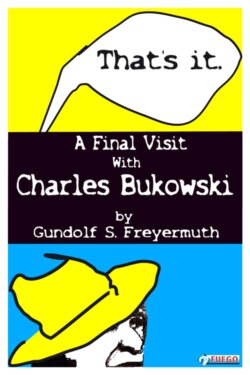Читать книгу That's It. A Final Visit With Charles Bukowski - Gundolf S. Freyermuth - Страница 10
На сайте Литреса книга снята с продажи.
ОглавлениеIV
To San Pedro.
- On a Pilgrimage -
Nonetheless, how do you face a man who is already nearer to the dead than to us who will live? How, above all, can you talk to him about dying? The day of my last visit with Charles Bukowski is August 15, 1993, a sunny summer Sunday and the day before his seventy-third birthday.
“For the next one he may not be around anymore,” Michael Montfort says. The stream of cars on the Hollywood freeway is like thick broth. Michael drives faster than the flow of traffic, and the eyes behind his glasses are filled with tears. He can’t possibly see much anymore. “Hank has outrun death again and again. Again and again. But this time he will not be able to pull off that trick.”
Michael Montfort is Bukowski’s greatest fan. The same superlative might be adequate for the collection of manuscripts, books, pictures, and memorabilia that the photographer has put together in his gray little house in the Hollywood Hills, high above the smoggy bowl of Los Angeles. Year after year he smuggled German journalists into Bukowski’s pad; helping to establish the author’s fame in the country that his parents left when he was two years old. In the course of their long friendship, Michael Montfort, born in Germany twenty years after Bukowski, became a lot like the object of his admiration. At first glance more than one of the poet’s many fans mistook the photographer for their idol. Michael Montfort lives partly for and on Bukowski, and he also lives a little bit like Bukowski.
“Damn, Michael has caught me in the supermarket when I had my hands on a watermelon, you know.” Bukowski told Jörg Fauser in 1977: “Michael had his cart filled up with six packs and potato chips, and what did I have? Peaches! Grapes! Lettuce! And I was fondling a watermelon! Of course, I played the cool daddy and grinned, but, damn it, he saw through me! Bukowski had flipped!”
The skeletons of cranes that arise along the freeway revolve idly in the soft coastal wind. In the docks container ships bob up and down, and at the end of the horizon the white clouds are driven swiftly over the empty crests of the Pacific. We are approaching the harbor of San Pedro.
“When Hank moved out here in 1978, we all thought that he had really flipped!” Michael Montfort says: “I thought living in San Pedro was ridiculously inconvenient for him. He had to drive for one hour just to have dinner at ‘Musso and Frank’s’ on Hollywood Boulevard, where he was a regular. Suddenly Hank lived in suburbia and became a kind of amusement-commuter.”
The run-down houses along the road, most of them kind of like furnished garbage piles, gradually disappear. Soon after we have left the freeway, San Pedro looks as if the inhabitants had scrubbed the streets, soaped the houses down and subsequently dissolved into hot air. A clean ghost town, dressed in its Sunday best, friendly and peaceful and a little tedious.
“Hank had earned his first real money,” Michael Montfort continues: “And his accountant wanted him to do something to avoid taxes. Buy some real estate.” Michael laughs. “Hank hated to look at other people’s homes. So without a moment’s hesitation he bought the second house his broker dragged him into.”
Few cars are on the road, and almost no pedestrians. We have entered a solid middle-class area, a no-man’s land somewhere between well-to-do and wealthy. Like elite garden gnomes, blue and white signs of private security companies line the lawns.
“Hank ... really ... is ...,” Michael Montfort says searching his feelings for words, as we arrive at Bukowski’s house.
The empty side-street smells of Sunday roasts. Hidden behind high trees, the old medium-sized house lies at the end of a narrow driveway. “And there is nothing short of dying ...,” Johnny Cash suddenly sings in my head: “... half as lonesome as the sound on the sleepin’ city sidewalks, Sunday mornin’ comin’ down ...”
As soon as the motor noise of our car dies away, a sunken and rather frail old gentleman appears and waves to us. His movements are tortoise-like, the movements of a survivor. Beaming, Michael Montfort raises his hand and finds the words he was looking for:
“Hank is too good-natured. A sweetheart.”
